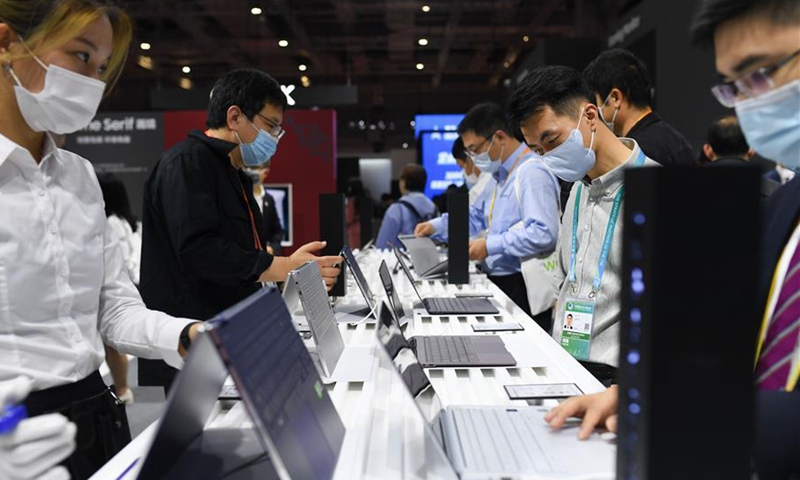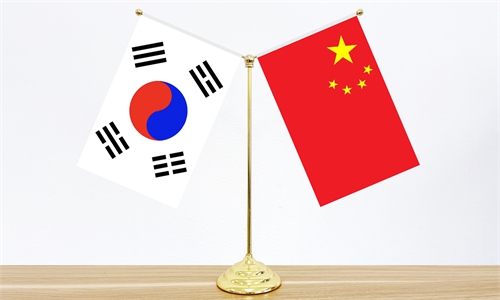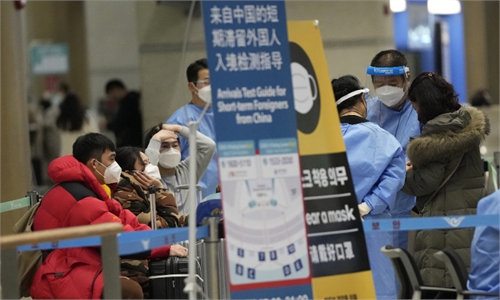
Visitors gather at the booth of Samsung at the Consumer Goods exhibition area during the 3rd China International Import Expo (CIIE) in Shanghai, on November 7, 2020. File photo:Xinhua
South Korea's semiconductors export to China, its largest trade partner, almost halved in January, impacted by the US' stepped-up chip war against China. But Chinese experts said South Korean chipmakers can't afford to lose the massive Chinese market.
They urged South Korea not to follow the US government in tightening chip export controls, and should continue to maintain global industrial and supply chain stability together with China.
The Ministry of Trade, Industry and Energy announced on Wednesday that South Korea's exports in January fell 16.6 percent year-on-year to $46.3 billion. Chip sales, the country's top export item, plunged 44.5 percent to $4.8 billion.
"Prices of core semiconductor components like DRAM, NAND and memory chips plunged as demand weakened and backlogs piled up, heavily damaging overall chip exports," it said in a press release on the South Korean government website.
In January, South Korea's total exports to China tumbled by 31.4 percent to $9.2 billion, the eighth consecutive monthly decline.
Sales of semiconductors to China slid 46.6 percent, while exports of petrochemical products to China dropped 22 percent, according to the South Korean ministry.
Along with falling chip exports came higher inventories at leading chipmakers including South Korea's Samsung and SK Hynix. US chip export curbs disrupted global chip supplies while global demand for consumer electronics plunged amid recessionary expectations in some developed countries, Xiang Ligang, a veteran telecom industry observer, told the Global Times.
In the fourth quarter of 2022, SK Hynix posted a loss for the first time in 10 years, according to a press release the company sent to the Global Times on Wednesday. Revenues stood at 7.699 trillion won ($6.3 billion), while the net loss was 3.524 trillion won.
Regarding exports of US semiconductor equipment to China, the company said during third-quarter earnings call in October that it would work closely with governments, customers and partners to prepare against external uncertainties and ensure business continuity, according to a transcript of the meeting.
South Korean chip firms may have difficulty in restoring lost export shortly whatever measures they take, Xiang said, and their operations may face greater challenges if they lose the Chinese market.
Chipmaking is an industry that requires close global cooperation. The US takes the lead in chip design, European companies such as ASML provide advanced manufacturing equipment, Japan has many upstream materials like photoresist, while South Korea is an important memory chip producer and the island of Taiwan dominates the foundry market.
However, South Korea faces increasing pressure from the US to join a chip circle excluding China. Japan and the Netherlands reportedly agreed to a chip control deal with the US.
Some South Korean firms have facilities for making NAND flash memory chips in China while a large proportion of dynamic random access memory (DRAM) chips are produced in South Korea and then exported to China, according to Han Xiaomin, general manager of Jiwei Insights in Beijing.
South Korean chipmakers may relocate their manufacturing to other countries such as Singapore and Vietnam so as to continue supplying China to maintain their share in the Chinese market, Han said, adding that "this would affect South Korea's foreign trade and local employment.



